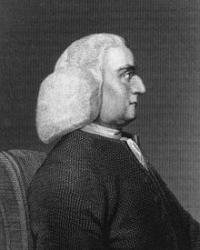Planning worship?
Check out our sister site, ZeteoSearch.org,
for 20+ additional resources related to your search.
- |
User Links
Person Results
William B. Bradbury

1816 - 1868 Person Name: Wm. B. Bradbury Composer of "AGAWAM" in Book of Worship William Bachelder Bradbury USA 1816-1868. Born at York, ME, he was raised on his father's farm, with rainy days spent in a shoe-shop, the custom in those days. He loved music and spent spare hours practicing any music he could find. In 1830 the family moved to Boston, where he first saw and heard an organ and piano, and other instruments. He became an organist at 15. He attended Dr. Lowell Mason's singing classes, and later sang in the Bowdoin Street church choir. Dr. Mason became a good friend. He made $100/yr playing the organ, and was still in Dr. Mason's choir. Dr. Mason gave him a chance to teach singing in Machias, ME, which he accepted. He returned to Boston the following year to marry Adra Esther Fessenden in 1838, then relocated to Saint John, New Brunswick. Where his efforts were not much appreciated, so he returned to Boston. He was offered charge of music and organ at the First Baptist Church of Brooklyn. That led to similar work at the Baptist Tabernacle, New York City, where he also started a singing class. That started singing schools in various parts of the city, and eventually resulted in music festivals, held at the Broadway Tabernacle, a prominent city event. He conducted a 1000 children choir there, which resulted in music being taught as regular study in public schools of the city. He began writing music and publishing it. In 1847 he went with his wife to Europe to study with some of the music masters in London and also Germany. He attended Mendelssohn funeral while there. He went to Switzerland before returning to the states, and upon returning, commenced teaching, conducting conventions, composing, and editing music books. In 1851, with his brother, Edward, he began manufacturring Bradbury pianos, which became popular. Also, he had a small office in one of his warehouses in New York and often went there to spend time in private devotions. As a professor, he edited 59 books of sacred and secular music, much of which he wrote. He attended the Presbyterian church in Bloomfield, NJ, for many years later in life. He contracted tuberculosis the last two years of his life.
John Perry
William B. Bradbury
Anonymous
Person Name: Anon. Author of "Affliction is a stormy deep" in Songs for the Service of Prayer In some hymnals, the editors noted that a hymn's author is unknown to them, and so this artificial "person" entry is used to reflect that fact. Obviously, the hymns attributed to "Author Unknown" "Unknown" or "Anonymous" could have been written by many people over a span of many centuries.
Anonymous
George Kingsley
1811 - 1884 Person Name: Kingsley Composer of "[Affliction is a stormy deep]" in Good-Will Songs Born: July 7, 1811, Northampton, Massachusetts.
Died: March 14, 1884, Northampton, Massachusetts.
Kingsley played the organ at the Old South Church and Hollis Street Church in Boston, Massachusetts. He also taught music at Girard College in Philadelphia, Pennsylvania, served as music supervisor for public schools in Philadelphia, and compiled a number of music books, including:
Sunday School Singing Book, 1832
The Harmonist, 1833
The Social Choir, 1836
The Sacred Choir, 1838
The Harp of David, 1844
The Young Ladies’ Harp, 1847
Templi Carmina (Northampton, Massachusetts: 1853)
The Juvenile Choir, 1865
--www.hymntime.com/tch
George Kingsley
William Tans'ur

1699 - 1783 Person Name: Wm. Tansur Composer of "BARBY" in Songs for the Service of Prayer William Tansur, b. about 1700, Dunchurch of Barnes; d. 1783, St. Neots Evangelical Lutheran Hymnal, 1908
Also known as Tansur; Tanzer; le Tansur
William Tans'ur
Nathaniel Cotton

1707 - 1788 Person Name: Cotton Author of "Affliction is a stormy deep" in Good-Will Songs Cotton, Nathaniel, M.D., born in 1707, and educated for the medical profession at Leyden. Giving his attention more especially to brain diseases, he first assisted a physician, who devoted his attention to the insane, at Dunstable; and they erected a large Asylum at St. Albans. In 1763 the poet Cowper became one of his patients, and, on his recovery, conceived a warm attachment for his medical friend. Dr. Cotton died at St Albans, Aug. 2, 1788. Several of his hymns appeared from 1760 onwards in Dr. Dodd's Christian's Magazine, some signed "Dr. Cotton, St. Albans," some “N.," and some without signature. His poetical works were published posthumously:— Various Pieces in Verse and Prose, 2 vols., Lond., Dodsley, 1791; and Visions in Verse, &c, with Memoir, 1808. His hymns came into use through Collyer's Collection, 1812.
They are:—
1. Amid the various scenes of ill. Affliction Sanctified. From Various Pieces, &c, 1791.
2. Tell me, my soul, O tell me why. Sin the cause of fear. From Various Pieces, &c, 1791.
3. This is the day the Lord of Life. Sunday. From Various Pieces, &c, 1791.
4. While sorrow wrings my bleeding heart. Suffering. From his version of Ps. xiii., "Offended Majesty, how long ?" in the Christian's Magazine, Feb. 1761.
5. With fierce desire the hunted hart. Ps. 42.
Dr. Cotton's most widely known hymn is, “Affliction is a stormy deep," q. v. It is a port of No. 5.
--John Julian, Dictionary of Hymnology (1907)
Nathaniel Cotton


 My Starred Hymns
My Starred Hymns


